In his programme book article accompanying John Doyle’s new production of Massenet’s Werther at Grange Park Opera, Rupert Christiansen describes the opera’s musical highlights as being scenes that ‘flow in and out of the emotional moment’. Doyle, though, seems to deliberately counter such fluidity in a production which is stylised, sometimes to the point of rigidity.
The ‘stripped-down’ aesthetic is Doyle’s signature approach. One might call it ‘minimalist’ – he would probably prefer ‘essentialist’ – he’s spoken before of ‘finding the story’, looking for the psychological core of a work.
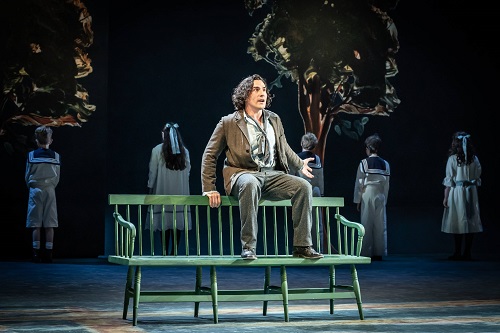
So, there is no real ‘set’ of which to speak. Against a misty teal backdrop stands a single tree, atmospherically lit by Tim Mitchell, looking a little like one of Charles Vess’s sketches for a Neil Gaiman novel. As the opera progresses, it is gradually joined by five other trees on flats which slide apart, then shift closer: metaphors for movements of and in the mind, I guess, as Werther flees the complexities of life seeking refuge in the countryside but finds himself lost in the woods.
Perhaps, also, they are an allusion to Goethe’s novel, in which the landscape is imbued with Romantic philosophical ideals and illuminates the workings of the Romantic mind. They could also be a more literal representations of the linden trees – that highly symbolic and hallowed tree which in German folklore is the ‘tree of lovers’ – which Werther repeatedly mentions in his letters and beneath which he is buried.
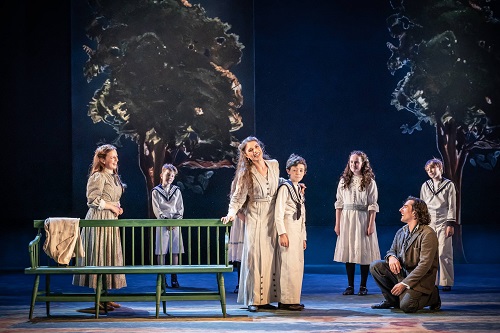
There are two park benches in Act 1; later a table and chairs. Presumably they are designed to denote, respectively, exterior and interior domains, but there’s little sense of what Christiansen describes as the strong dramatic contrast which pits ‘the quotidian domestic realities’ against the unfolding ‘secret and intimate feelings of Werther and Charlotte’. Instead, we drift in a sort of psychological hinterland, looking at the world through Werther’s eyes. There’s none of the ironic distancing created by Goethe’s epistolary form here. And, as the tortured yearnings of his mind and soul deepen, so the trees multiply and he (and we?) sinks into a wilderness of despair.
There’s a certain ‘poetry’ – the agony is elegant – but there’s a dramatic inertia at times, with characters standing still and singing more to us than to each other. Charlotte’s young siblings march in geometric patterns as they rehearse their Christmas carols – I kept expecting Julie Andrews to appear to keep the ‘Van Trapps’ in line.
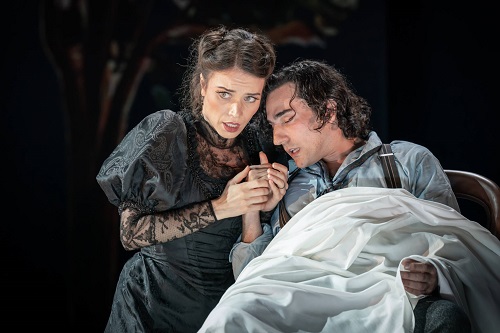
The music thus needs to do all the work in creating energy and drama, and Christopher Hopkins does draw committed playing from The Gascoigne Orchestra, defining the delicate moments sensitively and whipping up the climactic moments, but without every really compelling the ear.
There’s plenty of fervour from the two American singers in the central roles, tenor Leonardo Capalbo as Werther and mezzo-soprano Ginger Costa-Jackson as Charlotte. Looking every inch the Romantic hero, and acting with naturalism, Capalbo sings with unflagging passion, radiant and absolutely secure at the top, fluently embracing Massenet’s lyricism. Werther’s dreams are persuasively driven by a virile inner energy, but the unalleviated intensity is a bit wearing and at the close there’s a sense of bathos when, having shot himself with borrowed pistols, this Werther walks to the forestage, lies down and is covered by a clean white sheet.
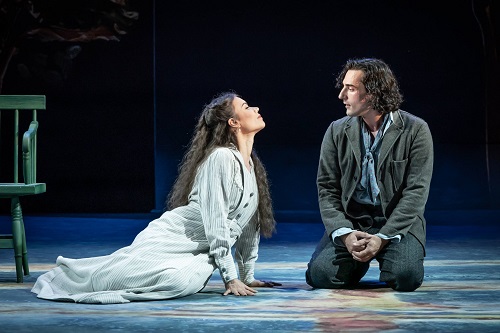
Rather than embodying bourgeois repression and duty, this Charlotte’s emotionalism is no-holds-barred. Certainly, Costa-Jackson can hold the stage, but the quasi-fierceness with which she wields her lusciously wine-hued mezzo, and the intensity of her emotive effusions, at times seem inappropriate for this passive paragon of feminine virtue and perfect homemaker.
The staging does not give us any sense of the Wetzlar that the other characters and townspeople see and live in; nor is the socially prescribed nature, and monotony, of their lives pressed home. We have to be told that it’s 1905, though the Edwardian costumes do provide context, and captions chart the passing months from summer, through autumn, and on to Christmas – though the trees are evergreen. We have only Werther’s vision, so the rest of the cast are not sharply drawn, at least dramatically, though all sing with accomplishment.
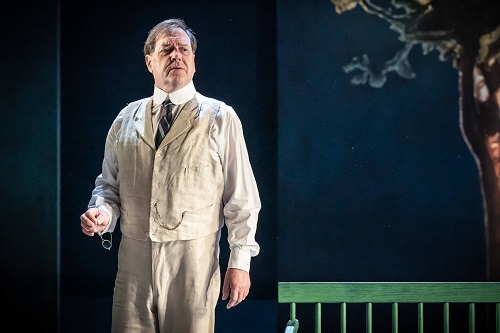
Dominic Sedgwick is touching as the staid and sturdy Albert, hinting at his genuine feelings of love and his vulnerability. Alan Ewing is a resonant Bailiff, Robin Horgan (Schmidt) and Ross Cumming (Johann) his boisterous friends. As the ingénue Sophie, Iria Perestrelo brings some welcome lightness, her outbursts of gaiety sparkling and fresh.
Doyle gives us an exercise in Romantic psychopathology. The trees tell of Werther’s wildness, but without a contrastingly persuasive portrait of the bourgeois society into which he is unable to assimilate, we are, like Werther, lost in the woods.
Claire Seymour
Werther – Leonardo Capalbo, Charlotte – Ginger Costa-Jackson, Sophie – Iria Perestrelo, Albert – Dominic Sedgwick, Bailiff – Alan Ewing, Schmidt – Robin Horgan, Johann – Ross Cumming, Charlotte’s siblings – Noah Evans (Fritz), George Wright (Max), Edi Haka (Hans), Joshua Barlow (Karl), Catherine Mulroy (Gretel), Lola-Marie Randall (Clara); Director-Designer – John Doyle, Conductor – Christopher Hopkins, Costume designer – Gabrielle Dalton, Lighting designer – Tim Mitchell, The Gascoigne Orchestra.
Grange Park Opera, The Theatre in the Woods, West Horsley; Saturday 17th June 2023.